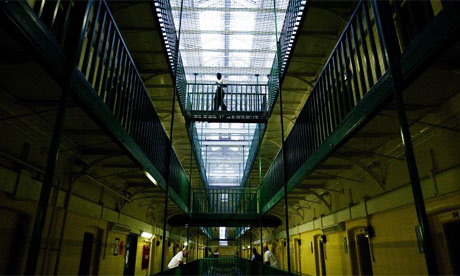Leaving 70,000 prisoners disenfranchised is morally inexcusable – and breaches the European convention on human rights
By Juliet Lyon


The chaotic scenes of hundreds of people turned away from polling stations unable to vote on 6 May were not the only democratic scandal of the general election. A further invisible 70,000 people were denied even the possibility of exercising their democratic right, after the government failed to overturn the unlawful blanket ban on sentenced prisoners voting.
In March 2004, the European court of human rights ruled that it is a breach of the European convention on human rights for the UK to disenfranchise all sentenced prisoners from parliamentary and local elections. Six years later that absolute ban remains in place. As the crossbench peer David Pannick QC has said, the fact that the government was prepared to go into the election in clear breach of the European convention is a constitutional disgrace and undermines the legitimacy of the democratic process. Whatever government emerges from the political horse-trading of the next few days should seek to comply with the European court's judgment as a matter of urgency. A coalition must not be an excuse for further prevarication and delay.
A recent judgement in April by the European court clarifies that the vast majority of prisoners will need to be given the vote for the UK to comply with the European convention. In the case of Frodl v Austria the court ruled that the 2005 decision makes it unlawful for Austrian law to disenfranchise all prisoners serving a sentence of more than one year in jail. The court emphasised that a decision to deny a prisoner the vote "should be taken by a judge, taking into account the particular circumstances". Moreover, "there must be a link between the offence committed and issues relating to elections and democratic institutions". This means that disenfranchisement may lawfully be imposed only on a small number of prisoners who have been sentenced for electoral fraud or a related offence.
The persistence of the ban is not only legally and morally inexcusable but has also undermined efforts of the prison service to rehabilitate offenders. The president of the Prison Governors Association, Paul Tidball, has said that the ban runs counter to resettlement work which aims to ensure that prisoners lead a responsible, law-abiding life on release. As the former chief inspector of prisons, Lord Ramsbotham, said in the House of Lords in April, in a last-ditch effort to amend the constitutional reform and governance bill: "What message does that attitude to the law send, not just to criminals but to young people who may be tempted to turn to crime?"
Before the election the committee of ministers at the Council of Europe, which oversees the execution of judgments by the European court, repeatedly warned the UK authorities of the implications of failing to comply with the Convention. The UK is now one of only a small handful of Council of Europe countries that still deny people in prison the right to vote. In March, the committee "strongly urged" the authorities to "rapidly adopt measures, of even an interim nature, to ensure the execution of the court's judgment before the forthcoming general election".
It also reiterated its "serious concern that a failure to implement the court's judgment before the general election and the increasing number of persons potentially affected by the restriction could result in similar violations affecting a significant category of persons, giving rise to a substantial risk of repetitive applications to the European court". The committee said it would revisit the issue after the election at its next meeting in June.
Pannick estimates that the European court could award each prisoner in the region of £750, and possibly more in the light of the delay in implementing the original ruling. The cost to taxpayers of government foot-dragging is likely to be high.
This issue should never have been allowed to get blown out of proportion. As we set out in our Prison Reform Trust briefing Barred From Voting, voting is both a right and a civic duty. Prison governors see it as an ordinary part of rehabilitation. The Electoral Commission sees no practical difficulty in enabling prisoners to vote. The former home secretary Douglas Hurd believes that giving people in custody the vote would encourage elected representatives to take a more active interest in what goes on behind bars. This disproportionate punishment of civic death, dating back to the Forfeiture Act (1870) has no place in a modern prison system and should be swept away as part of wider constitutional reform.

No comments:
Post a Comment